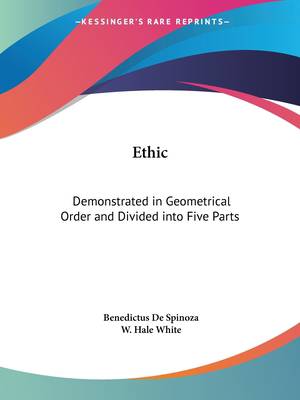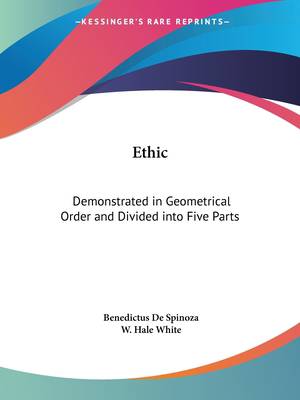
Door een staking bij bpost kan je online bestelling op dit moment iets langer onderweg zijn dan voorzien. Dringend iets nodig? Onze winkels ontvangen jou met open armen!
- Afhalen na 1 uur in een winkel met voorraad
- Gratis thuislevering in België vanaf € 30
- Ruim aanbod met 7 miljoen producten
Door een staking bij bpost kan je online bestelling op dit moment iets langer onderweg zijn dan voorzien. Dringend iets nodig? Onze winkels ontvangen jou met open armen!
- Afhalen na 1 uur in een winkel met voorraad
- Gratis thuislevering in België vanaf € 30
- Ruim aanbod met 7 miljoen producten
Zoeken
Ethic
Demonstrated in Geometrical Order and Divided into Five Parts
Benedictus De Spinoza
Paperback | Engels
€ 48,95
+ 97 punten
Uitvoering
Omschrijving
Ethics: Demonstrated in Geometrical Order and Divided into Five Parts is a philosophical treatise written by Benedict de Spinoza, a Dutch philosopher of the 17th century. The book is a systematic exploration of Spinoza's philosophical ideas and is divided into five parts. The first part of the book deals with God and nature, and Spinoza argues that God is not a personal being but rather an impersonal substance that encompasses all things. The second part focuses on the nature of the human mind and its relation to the body. Spinoza argues that the mind and body are two aspects of the same substance and that they interact with each other.The third part of the book discusses the nature of emotions and how they can be understood and controlled. Spinoza argues that emotions arise from our thoughts and that we can learn to control them by understanding their causes. The fourth part of the book deals with human bondage and freedom. Spinoza argues that true freedom comes from understanding the causes of our actions and that we can achieve this by cultivating reason and knowledge.The final part of the book deals with the nature of human happiness and how it can be achieved. Spinoza argues that true happiness comes from understanding the nature of reality and living in accordance with it. Overall, Ethics: Demonstrated in Geometrical Order and Divided into Five Parts is a complex and comprehensive work of philosophy that explores a wide range of topics, including metaphysics, epistemology, ethics, and psychology. It is considered one of the most important works of modern philosophy and has had a significant influence on subsequent philosophical thought.Translated by W. Hale White. Which Treat (1) of God; (2) of the Nature and Origin of the Mind; (3) of the Nature and Origin of Effects; (4) of Human Bondage; (5) of the Power of the Intellect, or of Human Liberty.This scarce antiquarian book is a facsimile reprint of the old original and may contain some imperfections such as library marks and notations. Because we believe this work is culturally important, we have made it available as part of our commitment for protecting, preserving, and promoting the world's literature in affordable, high quality, modern editions, that are true to their original work.
Specificaties
Betrokkenen
- Auteur(s):
- Uitgeverij:
Inhoud
- Aantal bladzijden:
- 396
- Taal:
- Engels
Eigenschappen
- Productcode (EAN):
- 9781564596253
- Verschijningsdatum:
- 1/02/1996
- Uitvoering:
- Paperback
- Formaat:
- Trade paperback (VS)
- Afmetingen:
- 210 mm x 284 mm
- Gewicht:
- 889 g

Alleen bij Standaard Boekhandel
+ 97 punten op je klantenkaart van Standaard Boekhandel
Beoordelingen
We publiceren alleen reviews die voldoen aan de voorwaarden voor reviews. Bekijk onze voorwaarden voor reviews.











